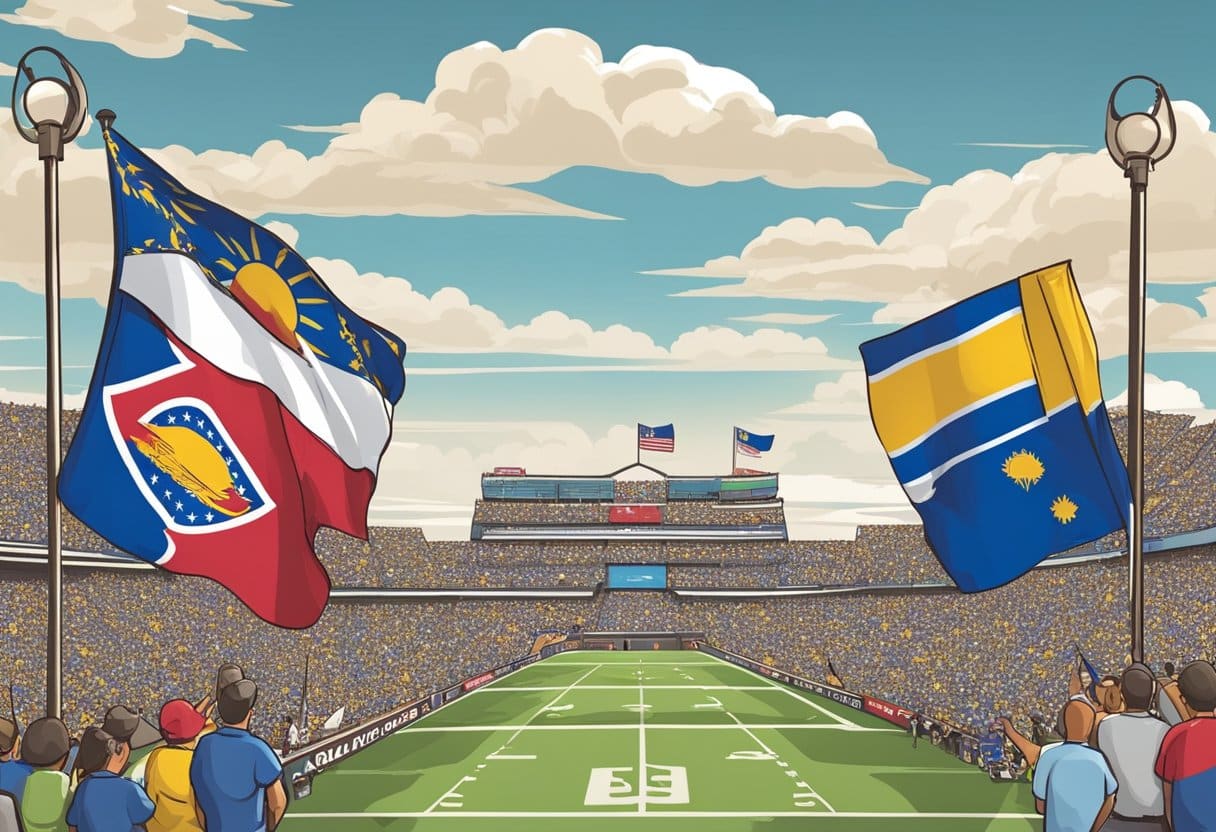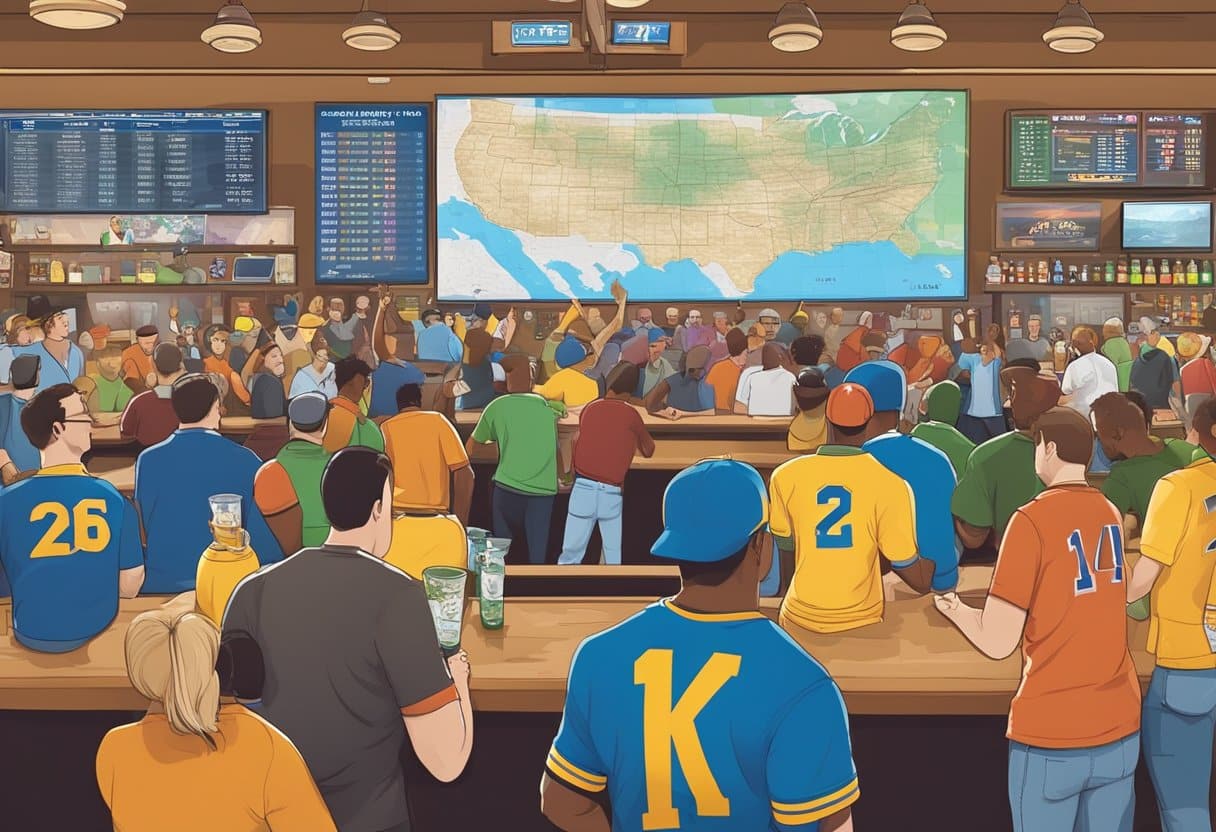Missouri sports fans have been crossing the border into Kansas to place legal sports bets, creating a significant economic impact on both states. This cross-border activity has become a common practice for Missouri residents seeking to participate in sports betting, which remains unavailable in their home state.

If Missouri voters approve the proposed constitutional amendment to legalize sports betting, Kansas could see a substantial decrease in its gaming tax revenue. The potential loss stems from Missouri residents no longer needing to travel to Kansas to place their bets, as they would have legal options available within their own state.
Despite Missouri voters approving legal sports betting during November’s election, implementation will not happen in time for Super Bowl LIX. This delay means Kansas will continue to benefit from cross-border betting activity in the near term, though the long-term outlook suggests a changing landscape for both states’ gaming industries.
Background on Sports Betting in Missouri and Kansas

The sports betting landscape between Missouri and Kansas represents a study in contrasts, with significant economic implications for both states. Kansas has embraced legal sports wagering while Missouri continues to navigate a complex regulatory path.
Legal Landscape of Sports Wagering
Kansas legalized sports betting in 2022, allowing both retail and mobile betting platforms to operate within state lines. The launch proved immediately successful, with the state collecting substantial tax revenue from betting operations. According to search results, Kansas sports gambling revenue reached $182.4 million after legalization, though the hold rate decreased slightly to 8.83% due to increased competition in the market.
Missouri, by contrast, has faced a more complicated journey. While voters recently approved legal sports betting during November’s election, implementation remains pending. Missouri sports fans, particularly Kansas City Chiefs supporters, have been unable to legally wager on major sporting events like the Super Bowl within their state.
This disparity has created significant cross-border activity. During Kansas’ first weekend of legal sports betting, approximately 16,000 Missouri residents attempted to place wagers using Kansas betting platforms.
Role of the Missouri Gaming Commission
The Missouri Gaming Commission serves as the regulatory body responsible for overseeing gambling activities within the state. As Missouri moves toward implementing sports betting following voter approval, the commission will establish rules and regulations governing the new industry.
The commission will likely be tasked with:
- Developing licensing requirements for operators
- Creating consumer protection safeguards
- Establishing tax collection procedures
- Monitoring for problem gambling issues
Research suggests the commission faces significant pressure to implement regulations quickly. The delay in launching sports betting in Missouri has already resulted in tax revenue losses as residents cross state lines to place bets in Kansas. A paper cited in the search results specifically tests for “cross-border substitution in casino gambling between Illinois and Missouri” related to sports betting availability.
Economic Implications of Cross-Border Betting
The flow of betting dollars across state lines creates significant economic ripples for both Kansas and Missouri. Recent data shows measurable shifts in revenue patterns and impacts on existing gambling establishments as bettors seek legal options.
Revenue Streams for Kansas and Missouri
Kansas has experienced substantial financial benefits since legalizing sports betting. The state’s gambling revenue has grown to $182.4 million, though the competitive market has slightly reduced the hold rate to 8.83%. This generates meaningful tax revenue that supports state programs and services.
Missouri, meanwhile, faces a double loss. Not only is the state missing potential sports betting tax revenue, but it’s also losing casino gambling revenue and admission fees. Fiscal analysts within the Missouri legislature project the state could earn approximately $28.9 million in tax revenue if sports betting were legalized.
This revenue gap has sparked intense political activity, with ballot measure campaigns raising an unprecedented $55 million to decide the future of sports betting in Missouri.
Impact on Local Casinos
Missouri casinos near the Kansas border are experiencing measurable declines in patronage. Research confirms cross-border substitution is occurring, with Missouri residents traveling to Kansas establishments to place sports bets.
This migration affects more than just sports betting revenue. When gamblers cross state lines for sports betting, they often engage in other casino games during their visit. This compounds Missouri’s losses through decreased slot machine play, table game participation, and ancillary spending on food and entertainment.
For Kansas casinos, this influx of Missouri customers provides a welcome boost. They benefit not only from sports betting activity but also from increased overall gambling participation and related spending during visits.
Missouri’s Casino Industry and Sportsbook Offerings
Missouri hosts a diverse gambling landscape with established casinos in major metropolitan areas. The state’s casino industry generates significant revenue despite sports betting remaining unavailable within state borders until 2025.
Casino Operations in Kansas City and St. Louis
Missouri’s casino market is concentrated primarily in two regions: Kansas City and St. Louis. Kansas City features several riverboat casinos that attract both locals and visitors from neighboring states. These establishments offer traditional table games, slot machines, and poker rooms.
In St. Louis, casinos operate near the Mississippi River, providing gaming options close to major attractions. Many of these facilities include hotels, restaurants, and entertainment venues to create complete resort experiences.
Casino attendance in both regions remains strong despite competition from neighboring states like Kansas. The St. Louis Cardinals baseball team drives significant traffic to nearby casinos during baseball season, with fans often visiting gaming floors before or after games.
Sportsbooks and Gambling Operators
Currently, Missouri does not have legal sportsbooks operating within state lines. This will change in 2025 when sports betting is expected to launch following voter approval of a constitutional amendment.
Major gambling operators are already positioning themselves to enter Missouri’s market. Companies operating in neighboring states have shown keen interest in expanding their footprint into Missouri.
The lack of legal sports betting options has created a significant cross-border movement. GeoComply data shows thousands of Missourians regularly cross state lines to place sports bets in Kansas and other neighboring states where the activity is legal.
This outflow of betting dollars has motivated Missouri lawmakers to accelerate legalization efforts. When sports betting launches in 2025, established casino operators will likely be among the first to offer sportsbook services.
The Role of Professional Sports Teams
Professional sports teams in Missouri have become key players in the sports betting debate, with many organizations advocating for legalization to capture revenue that currently flows to neighboring states like Kansas.
Kansas City Chiefs and Regional Fan Base
The Kansas City Chiefs hold significant influence in the sports betting discussion across the Missouri-Kansas border. Since Kansas legalized sports wagering in 2022, Chiefs fans living in Missouri often cross state lines to place legal bets on their team.
This migration of betting dollars has created a noticeable economic impact. Chiefs fans based in Missouri continue to wait for legal options in their home state, even missing the opportunity to bet on Super Bowl LIX within state borders.
The team’s massive regional fan base spans both states, creating a unique dynamic where Missouri residents contribute to Kansas’s betting revenue. According to search results, Kansas has generated over $18 million from sports wagering since its legalization.
Influence of the St. Louis Cardinals
The St. Louis Cardinals organization has joined other Missouri professional sports teams in pushing for legalized sports betting. Together, these teams have taken the issue directly to Missouri voters through Amendment 2.
The Cardinals’ widespread popularity throughout Missouri gives the organization significant political leverage in the debate. Their support likely influences public opinion, especially among their dedicated fan base.
Professional sports franchises in Missouri recognize the potential financial benefits of keeping betting dollars in-state rather than losing them to neighboring jurisdictions. The teams see sports betting as both a fan engagement opportunity and a potential revenue source through partnerships with betting operators.
Missouri Senate Bill 822 has received bipartisan support partly due to professional sports teams’ advocacy, as lawmakers respond to Kansas’s more aggressive approach to sports-related legislation.
Fan Engagement and Cross-Border Dynamics
The legalization of sports betting in Missouri creates a new dynamic between Missouri and Kansas sports fans. This shift affects how fans interact with their favorite teams and influences betting patterns across state lines.
Sports Fan Influence on Betting Patterns
Missouri’s approval of sports betting has significant implications for fan engagement in the region. Kansas City sports enthusiasts previously traveled to Kansas to place legal wagers, but this pattern will likely change with Missouri’s new legislation.
The crossover between Missouri and Kansas reflects the mobile nature of modern sports fandom. When fans can bet in their home state, they tend to place more frequent wagers on local teams like the Chiefs or Royals.
Kansas Budget Director Adam Proffitt has noted concerns about potential revenue losses for Kansas sportsbooks. Many Missouri residents who previously crossed the border to place bets will now likely stay in-state.
Sports betting also creates new engagement opportunities beyond just gambling. Fans often develop deeper connections to sporting events when they have money at stake, watching more games and following statistics more closely.
Professional sports teams in Missouri stand to benefit from increased viewership and fan interaction. The integration of sportsbooks with stadium experiences may further enhance this connection between teams and their supporters.
Legislative Future of Sports Betting in Missouri
Missouri stands at a crossroads with sports betting legislation. Amendment 2 has set the stage for significant changes to the state’s gambling landscape, with important implementation deadlines approaching.
Current Initiatives and Proposals
Amendment 2 will be on Missouri ballots on November 5, 2025. This constitutional amendment would legalize both in-person and online sports wagering throughout the state. If passed, implementation would be required by December 1, 2025.
The proposal includes critical regulatory frameworks and a $5 million fund specifically dedicated to addressing compulsive gambling. This fund represents one of the most progressive approaches to responsible gambling in any state legislation.
Currently, Missouri residents cross state lines into Kansas, Iowa, and Illinois to place legal sports bets. This border crossing results in significant tax revenue losses for Missouri, estimated at millions of dollars annually.
Predictions for Legal Changes
Industry analysts expect Amendment 2 to pass based on polling data and the success of similar measures in neighboring states. This would create a competitive sports betting market in Missouri with multiple operators.
The legislation would likely permit:
- Mobile betting across the state
- In-person betting at existing casinos
- Professional and college sports wagering
- Multiple licensed operators
Economic projections suggest Missouri could generate $15-20 million in annual tax revenue from sports betting. This would significantly impact Kansas sportsbooks, which currently benefit from Missouri bettors crossing state lines.
Implementation challenges will include:
- Establishing regulatory bodies
- Licensing processes
- Consumer protection measures
These must be addressed before the December 2025 deadline.



